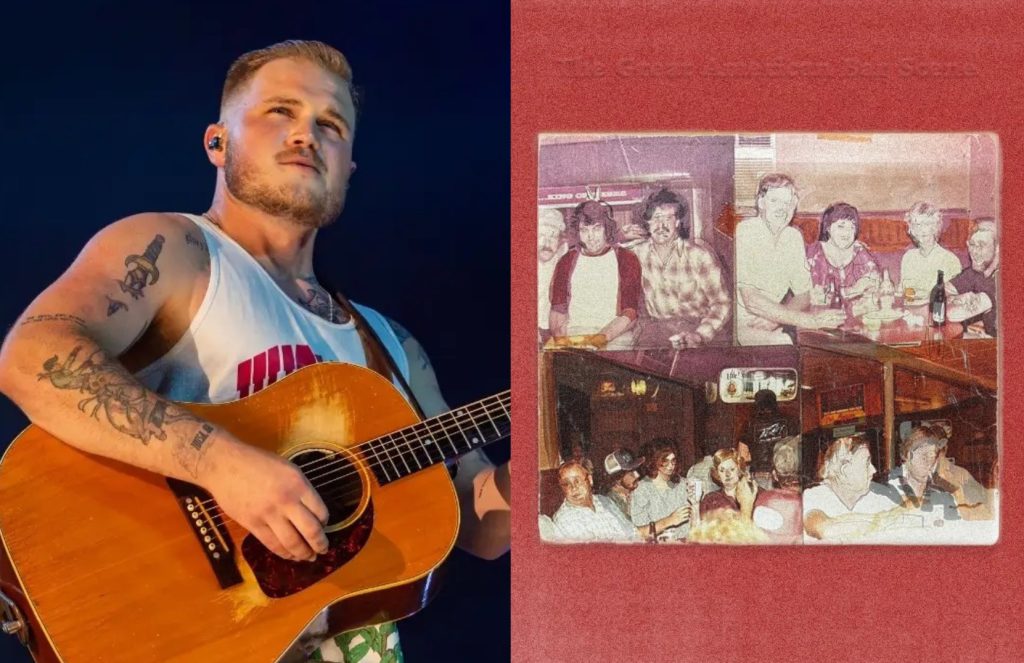Being a Zach Bryan fan before the pandemic, it’s safe to say that I have a long history with the “Heading South” singer. Discovering him in early 2020 just months after his debut album, DeAnn, dropped, I’ve had the opportunity to watch his meteoric rise to fame. From the early days of DeAnn and Elisabeth to the triumphant release of the mammoth American Heartbreak, I’ve enjoyed nearly everything Bryan has released over the course of the last five years. The question that remains is, “Does The Great American Bar Scene live up to the high expectations that Bryan has set for himself over the past few years?”
I would have to say yes.
Upon my first few listens to The Great American Bar Scene, I found the 4th of July release and even the name of the album a bit of a head-scratcher. And while I still find the 4th of July date a bit misguided, the name began to click with me. On the surface, the record doesn’t contain a lot of tracks that you’d typically hear blasting through the speakers at a bar, but I don’t believe that was Bryan’s intention here.
The more you listen to this album, the more you realize that this record is not about the titular great, American bar scene but instead is about all of the stories swapped, memories made and people met there. As I alluded to, The Great American Bar Scene, at its core, is a contemplative record. While, of course, there are high-energy crowd-pleasers like “Oak Island” and “American Nights,” which is looking to be the runaway hit off of the record, it’s clear that Bryan was much more focused on crafting narratives that would be brought up in quiet conversations at a bar.
One of the most profound examples of this has to be “Towers,” a track that ponders who God is and how he manifests in our lives. The central question of “Do you think God’s a person?” is already a compelling concept that has been debated for centuries, but Bryan makes this concept his own by theorizing that He appears in everything from the reflection of light in your lover’s eyes to the sound of laughter through the walls to time itself. These theories, while poetic in their own nature, once again tie into the fact that this album, at its core, is about the meaningful conversations had at bars across the country.
With all that being said, however, The Great American Bar Scene still contains the main criticism that has plagued Bryan over the past few albums, that criticism being the similarity of songs and production throughout the record. While, of course, it’s not like every single song sounds the same given that it would be foolish to say that “American Nights” sounds like “Boons,” I wish he would have pushed the boundaries and stepped outside his comfort zone a bit more.
It’s been a long-known fact that country, at its core, is about three chords and the truth. And while I absolutely agree with this sentiment, I think it is fair to point out the similarity present on some of the tracks here on The Great American Bar Scene. The four songs that really stick out to me are “Mechanical Bull” and “Purple Gas” as well as “Bass Boat” and the aforementioned “Boons.” I’m not going to say that they are bad songs; they’re far from that actually. That being said, however, these are the four that I feel could have been separated on a different project to circumvent similar-sounding songs being on the album.
“Purple Gas,” in particular, feels like a bit of an odd choice to include on the album to me. Though it was released multiple weeks prior, I personally would have liked the track to simply be a non-album single. Lyrically, it’s a great song from Hofmann; however, their vocals aren’t particularly great together. I can’t fault Hofmann given that it’s ultimately her song, but I don’t think it truly adds anything to the album. I might be a little biased given that it comes directly after arguably his best run of songs from track three, “The Great American Bar Scene,” to track six, “Oak Island.”
Another common criticism of Bryan’s music is the production (or lack thereof), and I have to admit that it’s a bit of a mixed bag here. There’s no denying that he made a name for himself on his incredibly raw, acoustic tracks on DeAnn and Elisabeth, and it’s been a bit of a staple for him. With that being said, however, on his third major-label album, Bryan should be a bit pickier with the way some of these songs sound. Some tracks, “Mechanical Bull” in particular, feel a bit subpar compared to the production present on his more recent releases.
That’s not to say that there aren’t instances of great production present throughout The Great American Bar Scene. “Oak Island,” “American Nights” “28” and most notably the title track are arguably the best-sounding Zach Bryan songs to date from a production standpoint. I particularly love all the added ambient sounds of the pool balls and bar attendees throughout the title track that add a sense of realism to the scene he paints in the song.
I would be amiss not to talk about the star-studded features that include the likes of the legendary Bruce Springsteen and John Mayer as well as the severely underrated John Moreland. As we saw on Bryan’s 2023 self-titled release as well as the Boys of Faith EP, he has been enlisting some of the best musicians working today and I also have to admit that the features on The Great American Bar Scene are stellar. Being a massive fan of Mayer, Springsteen and Moreland, I absolutely love what they bring to the table here.
All three tracks feel like a perfect blend between Bryan and the respective artists that are featured. On “Better Days,” Mayer does exactly what he does best and compliments the song perfectly with his masterful guitar work. We all know that he can absolutely let loose on guitar solos (see “Covered In Rain” for proof), but he shows a lot of restraint here. It’s clear that he knew exactly what this song represented, a lyrics-first track about appreciating life for what it is, and didn’t feel the need to over-play on it. His signature, slightly distorted tone sounds brilliant here.
As for “Sandpaper,” you can feel the Springsteen influence from the first note. With percussion that sounds incredibly similar to his 1985 hit, “I’m On Fire,” the track is one that blurs the line between country, folk and heartland rock. There’s no denying that Springsteen’s voice is an acquired taste, but I personally love his inclusion. Like Mayer’s feature on “Better Days,” Springsteen’s feature simply feels like a dream come true as a fan of both artists.
Overall, The Great American Bar Scene is another rock-solid album from the Oklahoman singer/songwriter. Though I would have liked to see him explore some different sounds a little bit more frequently throughout the album similarly to his 2023 self-titled release, there’s no denying just how good of a lyricist Bryan is. While I’m not going to crown him as the best lyricist of our generation given that the likes of Jason Isbell, Tyler Childers and John Mayer (among others) have many years on Bryan, it’s becoming abundantly clear that he is one of the best of the best.
8/10


